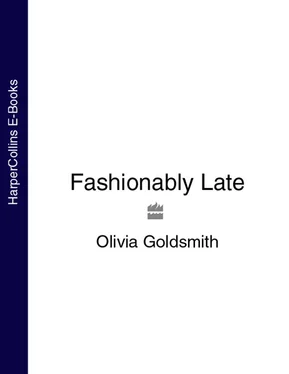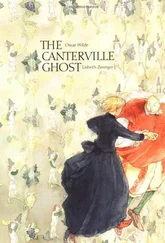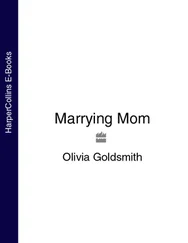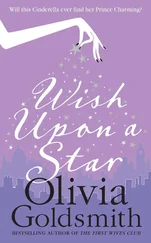Suddenly the mistress of ceremonies, Leila Worth, began speaking from the podium set at the corner of the stage. ‘If I may ask for your attention,’ she cooed over a sound system that had to be set on supermax to be heard over the braying and whinnying of the mavins of couture. The fashion crowd was a loud one. At last they settled down.
The next part of the evening was a blur to Karen. There were the inedible couple of courses of food and the blah, blah, blah of several speakers who talked about the Oakley Awards and the industry and fund-raising. There was the buzz of conversation that rose to an almost unbearable din between each speaker, and the predictable music – some Lester Lannin knock-off band. Then the lights dimmed and Leila Worth got back behind the podium.
‘Tonight we are gathered to honor an American fashion great.’ Goose pimples ran up Karen’s arms and down her back. Was that her? She looked down at her plate of untouched chicken divan and wild rice. She was a fashion great? She didn’t know if she was thrilled, embarrassed, or upset. Maybe all three. Did Coco Chanel, Karen’s idol, feel ambivalent when she was fêted? Probably not, but then Chanel was a fashion great. Karen sat there feeling like both Miss America and an imposter. She tried to focus again on Leila’s words. After all, you didn’t get a Lifetime Achievement Award every day.
‘In the last twenty years, American fashion has become the fashion of the world,’ Leila was saying. Karen wondered how the French and Italian designers in the room felt about hearing that! If it wasn’t completely true, it was more true than it had ever been before. America was the place that had created a system that could move a designer’s vision out to virtually every corner of the world. It had taken three decades, but the Oakley Awards had been one of the mechanisms that had focused the attention of the fashion magazines and buyers on American designers. Leila could be excused the hyperbole.
‘Nobody represents American fashion, nobody knows American women, better than the designer we are here to honor tonight. In the last decade, the continuous flow of beautiful, luxurious, and wearable clothes has never stopped coming. No one has a greater mastery of form, a deeper understanding of the subtleties of color, and no one has been more industrious or creative in her search for the right material, the unique material, the original material, as Karen Kahn. Here are some examples.’
The spot focusing on Leila went black, and from out of the wings the parade of tall, gorgeous women began. Leila’s disembodied voice continued, describing some of the designs and their importance or originality. Now, in the semi-darkness, Karen knew what to do with her eyes. She drank in the spectacle – a collection of the work she had done in the last decade. Karen nodded at the big-shouldered sheath dress and matching knit jacket, the unconstructed blazer and sleek cropped pants, even the bias-cut silk knit evening gown, though evening wear had never been her strongest suit. The clothes on the models moved, they reflected the light, and they seemed both a decoration and an organic part of the beautiful bodies they draped. That was the trick, the riddle, that Karen was always trying to solve – how to conceal, reveal, and yet also be a natural extension of a woman’s body.
With most of these clothes, she thought, she had succeeded, and just for once, for this delicious moment, she could sit there and be happy with her work. She was no wunderkind – hell, she was hitting middle age – but if she felt that she’d been overlooked for years, now that she was finally being recognized she’d just consider it fashionably late. Karen could sense that the audience felt her vision, and when the last number – the previous season’s rich cocoa cardigan and legging outfit in wool with a simple chiffon undertunic – swirled off Leila called out her name. Karen rose effortlessly and walked across the gleaming empty dance floor to the stage.
The ovation sounded thunderous, but so was the sound of her own heartbeat in her ears. She hoped her hair looked all right; she knew that the satin pants and cashmere jacket she was wearing, the latter trimmed in satin banding, would catch the light and throw it back to the audience. She ascended the steps and turned toward the audience. The spots blinded her, but she was prepared and tried to look out at the darkness behind them without wincing. Leila hugged her, and the applause surrounded the two of them, a clichéd tableaux from every award ceremony that had ever come before. Karen looked over the room full of everyone who was anyone in the fashion world.
‘Thanks, friends,’ she began.
Jeffrey and she were getting ready to leave when Willie Artech approached their table. Willie was another designer, slightly younger than Karen, who also had been juggling an emerging Seventh Avenue business. About five years before he had been the hot guy, but underfinancing and missed delivery dates – an absolute mortal sin in the rag trade – had taken the luster off his name. So had AIDS. He stood there now, alone, in a tuxedo that was far too big for his wasted frame.
‘Congratulations, Karen,’ he said. He raised a glass unsteadily. ‘We who are about to die salute you.’
Everyone at the table, most of them in the process of gathering their things, stopped.
‘I’d hoped to get the award tonight, but homosexuality isn’t as fashionable as it once was.’ He shrugged. ‘ Res ipsa loquitur. That’s Latin for “the facts speak for themselves.”’ Willie grinned, his head skull-like. ‘Pretty appropriate, don’t you think? A dead man speaking a dead language.’ His voice dropped, and he bent his head. ‘This was a hard night. I’d hoped to win. I don’t have any children. I would have liked to leave behind something that would make sure I’m remembered,’ he whispered.
‘I’m sorry, Willie,’ Karen murmured.
Carl stood up. His lover had died just two years ago. ‘Let’s go, Karen,’ he said. Jeffrey, who had been off to fetch coats, returned and helped Karen into hers. The table broke up, leaving Willie standing unsteadily alone.
Defina took Karen’s arm. ‘Don’t take it personally,’ she whispered. ‘You know how it is with gay men designers: it’s always “chére, chére la mére.” And tonight you got hit with his mother stuff.’
Despite Defina’s attempt at comfort, it was an unpleasant ending to a wonderful night and Karen felt an immediate stab of guilt. Somehow she knew how Willie Artech, the spectre at the table, felt.
‘Jesus,’ Carl said as they exited the room. ‘In the face of eternity, who could care so much about an award?’
But Karen, clutching the Oakley plaque, her hand once again protectively over her belly, could understand how someone might.
CHAPTER TWO
Barren Karen
The day after she received the Oakley Award, Karen sat numbly in Dr Goldman’s waiting room, trying to cope with his verdict. Irreparably infertile.
Somehow, she’d known all along. From the first, through all the tests, all the drugs, all the examinations, despite Jeffrey’s own doubts and his regimen of doctors, she’d known it was her and she’d known her condition was irrevocable.
It was odd, but the moment the doctor gave her the official news, Karen flashed on the idea of finding her real mother. But perhaps that wasn’t odd. Perhaps that was typical of barren female adult adoptees, she thought. How would she know? How many of us are there, she wondered? Are we a significant enough demographic lump to be charted as some baby-boomer subset? Have we already appeared on Oprah? Is there a twelve-step program or a support group for us?
Читать дальше












